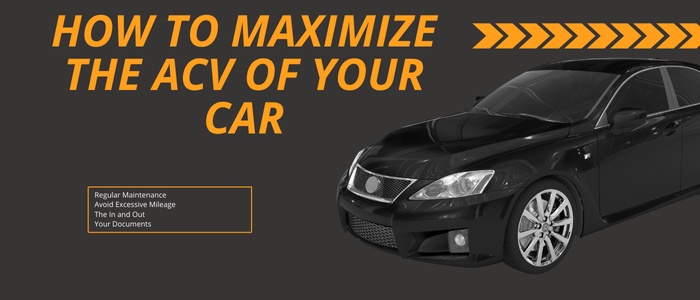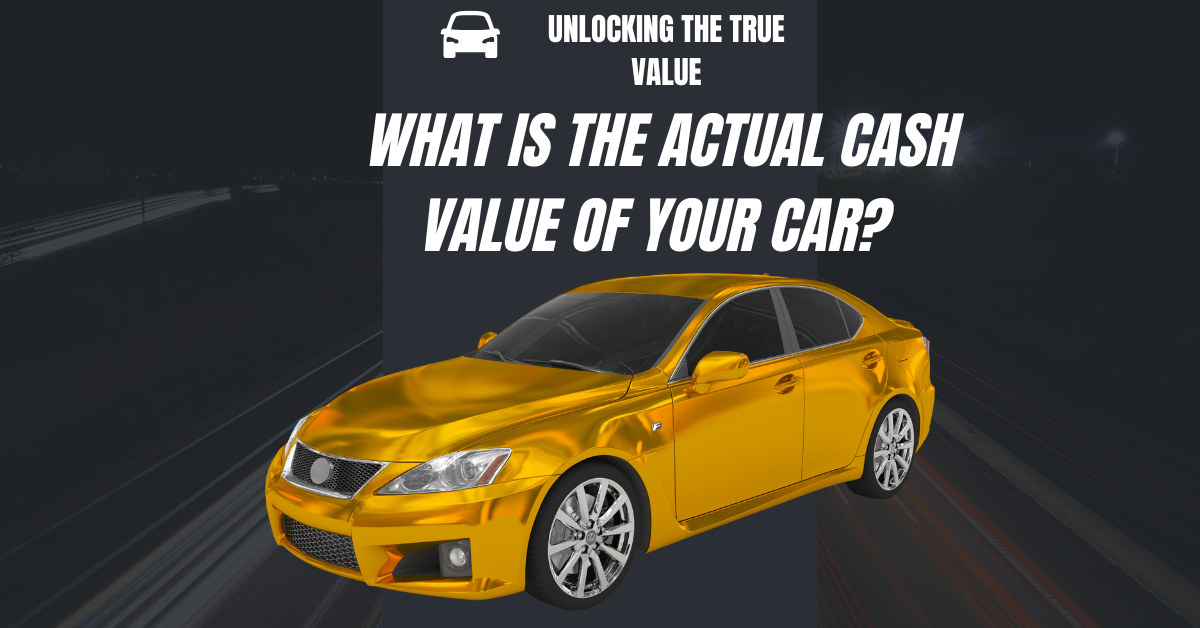You will need to know the actual cash value if you sell your car, trade it in, or file a claim. ACV means the price your vehicle may fetch at the moment in its present condition, considering the factor of depreciation. It is in this regard that the following comprehensive coverage will help walk you through everything you need concerning determining the ACV of your car, the factors that influence it, and how it impacts your financial decisions.
What is Actual Cash Value?
ACV stands for Actual Cash Value, which means the car’s depreciated current market value. In contrast to replacement cost, designed to replace your vehicle if it is either stolen or damaged beyond repair, ACV considers the value of the automobile at the time of loss or damage.
• Actual Cash Value (ACV): This refers to the market value of your car, depreciated for wear, tear, and other factors which lower its value over time.

Factors that Will Determine Your Car’s ACV
Several factors will establish the actual cash value of your car. They include age, mileage, condition, make, and model, with general demand in the market. These are things that can help you project your car’s ACV better.
Key Factors:
1. Age of the car: The newer the car model, the more ACV value it will have over the old ones.
2. Mileage: The higher the mileage, the lower the ACV value of the vehicle.
3. Condition: Well-maintained vehicles have higher values in the market.
4. Make and Model: Brand name and model show some retention of values that others will lack.
5. Market Demand: The one with more demand has an increased chance of commanding a better price.
| Factor | Impact on ACV |
| Age | Decreases with age |
| Mileage | Decreases with higher mileage |
| Condition | Increases with better condition |
| Make and Model | Varies by brand/model |
| Market Demand | Increases with higher demand |
How to Determine the ACV of Your Car
The ACV of your car can be determined in a few ways, which are through online valuation tools, dealerships, and sales of similar vehicles in your area recently.
How to Determine ACV in Steps:
1. Online Valuation Tools: Kelley Blue Book and Edmunds are some websites that will estimate costs based on details you provide about your car.
2. Consult Dealerships: Dealers can appraise your vehicle, given the condition of the market at that time.
3. Check recent sales: Scan through similar cars sold in your area to understand current market values.
This would help to give you an accurate quote for the ACV of your car. Be sure that you describe each of these sources about the exact make, model, year, mileage, and condition of your car.
The Role of ACV in Insurance Claims
The biggest factors in determining what kind of money you will get in return from your insurance company in case your car gets involved in an accident or is a total loss is the ACV of your car. Knowing how ACV is determined may help you navigate through the process of claims better.
Process for Insurance Claim
1. Assessment: The assessment of the condition and market value of the car is done by the insurance adjuster.
2. Calculation: Determine the ACV with respect to depreciation and current car value.
3. Payout: You get a payout for the ACV minus any deductible.
It is very important to know how depreciation has an impact on the ACV. It might result in a lower payout than expected. Detailed documentation of your well-maintained car will help prove a higher ACV in case you have to make a claim.
| Step | Description |
| Assessment | Adjuster evaluates car’s condition and market value |
| Calculation | ACV calculated considering depreciation |
| Payout | Payout based on ACV minus deductible |
How to Maximize the ACV of Your Car

Maximizing your car’s ACV requires you to maintain its condition and regular servicing without racking up mileage excessively. Here are some points that can help increase your car’s value:
Tips to Maximize ACV:
1. Regular Maintenance: Follow through with the scheduled oil changes, tire rotations, and other services in the schedule.
2. Avoid Excessive Mileage: Limit your long trips and useless driving.
3. The In and Out: Clean the exterior by washing and waxing; clean and undamaged interior.
4. Your Documents: Keep service records performed and receipts.
5. Small Repairs: Do small repairs as needed so they don’t become big ones.
By these tips, you will be helping your car maintain its value to the best level it can, ensuring maximum ACV value when you need it the most.
ACV vs Replacement Cost vs Market Value
One needs to know the differences between an ACV, replacement cost, and market value in order to make informed decisions financially that have to deal with your car.
Correct Definitions:
• Actual Cash Value: Depreciated current market value of your car.
• Replacement Cost: Cost of replacing one’s car with a new one of like kind and quality.
• Market Value: The amount of money one would sell their car for in the market today.
All these values have different purposes; knowing the differences can help in comprehending insurance policies and claims better and making the right decisions at the time of purchasing or selling a car.
| Value Type | Description |
| Actual Cash Value (ACV) | Current market value considering depreciation |
| Replacement Cost | Cost to replace with a new similar car |
| Market Value | Current selling price in the market |
Common ACV Misconceptions
A variety of ACV-related misconceptions can befuddle your thinking. Clearing up these misconceptions will help you come to a better understanding of what your car is worth. Some of these include:
1. ACV is the same thing as replacement cost. ACV considers depreciation; replacement cost does not.
2. ACV will always equal the loan balance. ACV could be less than what you still owe on your car, especially if it has depreciated a lot.
3. ACV is the Same as Trade-In Value: Although this could be the case in some situations, most of the time the ACV will be higher than trade-in value since trade-in offers include dealership profit margins.
Now that you know these myths, you should be able to come close to evening your expectations if forced to deal with insurance claims or sell your vehicle.
How ACV Affects Selling or Trading In Your Car

The ACV will greatly influence the amount of money you receive when you sell or trade in your car. Knowing what your car’s ACV is can help you in trying to get the best deal possible for your car.
Sell vs. Trade-In:
• Selling: Selling the car privately may get you closer to the ACV.
• Trade-In: The dealer may give less than the ACV since it includes their profit margins.
Look at what both are offering and go with your car’s assessed value to get a good deal.
ACV in Leasing and Financing
ACV is also useful when one is making decisions involving leasing and financing. It can alter the terms under which you lease or borrow on an asset, and it may determine how much you will be asked to pay if your car is totaled.
Leasing:
• ACV and Residual Value: The residual value of the car at the end of the lease is estimated from the projected ACV.
• Gap Insurance: In cases where the ACV turns out to be lower than that for which the lease payoff is made, gap insurance can help bridge the gap.
Financing:
•Loan-to-Value Ratio: Lenders use the ACV to estimate the amount of money a borrower can avail on a loan and the rate of interest to be charged.
• Total Loss Scenarios: If your car gets totaled, then the insurance money paid out will be based on the ACV, which could leave a remaining loan balance.
How to Understand Depreciation and its Effects on ACV
Depreciation plays an important role in determining the ACV of your car. By understanding how depreciation is calculated, you will further be able to know where your vehicle will be priced in years to come.
Factors of Depreciation:
1. Age: Cars depreciate more dramatically during the first few years.
2. Mileage: Higher mileage means higher depreciation.
3. Condition: Fast depreciation occurs due to poor maintenance and damage.
4. Market Trends: There may be a change in depreciation if there is a change in market demand.
Understanding this, you can build your way of diminishing it in order to secure a higher ACV for your car.
| Depreciation Factor | Impact on ACV |
| Age | Decreases rapidly initially |
| Mileage | Higher mileage reduces ACV |
| Condition | Better condition maintains ACV |
| Market Trends | Demand fluctuations affect ACV |
How to Compare ACV by Vehicle Make

Different types of vehicles depreciate at varying rates, and this leads to differences in their ACV. Some cars retain their values due to reputation and brand, reliability, and current demand in the market. In that regard, vehicles fall into two broad categories:
Top value retention vehicles:
Toyota: Longevity and reputation for reliability.
Honda: Favorite for good resale value and market demand.
Subaru: Known for durability and all-wheel drive.
Low- value retention vehicles:
Luxury: These vehicles have the capacity to fetch a higher price. Initial depreciation is high, and their prices have to be higher.
This helps you see how these values are different for various models so you can pick a vehicle that has a high ACV amount over time.
| Brand/Model | Retention Rate |
| Toyota | High |
| Honda | High |
| Subaru | High |
| Luxury Brands | Low |
| Niche Models | Low |
How to Dispute an ACV Assessment
If you believe that your car’s ACV assessment is too low, then you can dispute it. Here is how:
Steps to Dispute ACV:
1. Gather Evidence: Gather documentary evidence such as recent sales of similar cars and maintenance records. Independent appraisals may also come in handy.
2. Submit a Complaint: You will have to write to your insurance company with a formal complaint.
3. Negotiate: You will have to negotiate with your insurer and present all the evidence to support this.
4. Seek Mediation: If needed, seek mediation or professional help to resolve the dispute.
By following these steps, you can ensure that you are going to get a fair judgement about the ACV of your car.
The Future of ACV: Technological Advancements
Technological advancement is changing the way ACV is calculated. New tools and techniques are making the valuation process more accurate and streamlined.
Technological Trends:
1. Automated Valuation Tools: Through big data and AI, a more accurate valuation is delivered.
2. Telematics: This would be used to source real-time information regarding the usage and condition of the car.
3. Blockchain: For ensuring transparency and accuracy in the valuation record.
These developments may likely make ACV appraisal more accurate, and the owner of the car get just valuation for his or her car.
ACV Legal Aspects
The legal aspects of the ACV have to be understood in particular in cases involving insurance claims and disputes.
Key legal aspects:
1. Policy Terms: What is mentioned in your insurance policy? How the ACV will be determined, what is covered, etc.
2. State Laws: Such legislation differs from one state to another regarding ACV and claims.
3. Consumer Rights: Knowing your rights will help you navigate disputes and ensure a fair deal for you.
You should consult an attorney, for further advice on how to protect your interests.
ACV and Total Losses
In case your car is a total loss, then the amount you will receive from your insurance provider is based on the ACV. Knowing this will help in preparing for such occurrences.
Total Loss Process
1. Assessment: This is where the insurer assesses the damage and considers the car a total loss.
2. ACV Calculation: The actual cash value is estimated so as to come up with the amount of settlement.
3. Settlement: You will get the amount as per the ACV less deductible.
Knowing the ACV of your vehicle and keeping it in good condition will ensure that you receive an appropriate payment in case your vehicle is a total loss. This information on ACV also proves very useful in case your car has been stolen. In this case, the insurance payout for you will be based on the ACV of the car. In light of this, understanding how it is determined may help an individual approach the situation better when their car gets stolen.
Theft Claim Process:
1. Report the Theft: Report the theft immediately to the police and your insurance company.
2. Investigation: The company investigates the claim and confirms parts of your car.
3. ACV Calculation: The ACV will be calculated to determine how much payout to give you.
4. Settlement: You are paid for the loss, based on the ACV less any deductible.
Hence, having comprehensive coverage helps to ensure that you are better protected against car theft.
How Market Trends Impact ACV
Market trends are influential factors for your car’s ACV. If you understand the various market trends, you can make necessary predictions on changes in your car’s value.
Factors of Market Trend:
1. Economic Conditions: Economic downfalls bring down values of the cars.
2. Fuel Prices: Increased fuel prices reduce demand for less fuel-efficient cars.
3. Technological Advances: New advanced technologies may reduce the charm of older models.
4. Environmental Regulations: Strict regulations reduce the value of certain cars.
Knowing what’s going on in the used car market can help you make better decisions when buying, selling, or insuring your car.
| Market Trend Factor | Impact on ACV |
| Economic Conditions | Decrease in car values during downturns |
| Fuel Prices | Reduced demand for less efficient cars |
| Technological Advances | Older models become less desirable |
| Environmental Regulations | Certain cars lose value due to regulations |
Practical Tips to High ACV
The key to high ACV is constant care and attention toward your car. Here are some practical tips to help you in preserving the value of your car:
Maintenance Tips:
1. Regular Servicing
Always follow the recommended service schedule.
2. Keep it Clean
Wash and wax the car regularly to protect the paint from fading.
3. Address Issues Promptly
Address all mechanical issues as soon as possible.
4. Use Quality Parts
Always repair with OEM or high-quality replacement parts.
5. Maintain Records: Keep records of all servicing and repairs.
By following these tips, you can ensure that your car sustains maximum value, thereby ensuring a better ACV.
Understanding How Accidents Affect ACV
Accidents can have a severe impact on the ACV of your car. Even after repairs, the value is compromised by the accident history of the car.
Effect of Accident:
1. Instant Depreciation: As soon as an accident takes place, there is an instant reduction in the value of the car.
2. Diminished Value: The value of the car remains low, even after repairs.
3. Insurance Factors: Higher premiums later on with your insurance company.
Knowing how ACV works in regard to accidents helps you be better prepared to decide whether to fix an accident-damaged car or even file an insurance claim.
ACV as a Tool for Financial Planning
ACV can be a great financial planning tool for deciding to buy, sell, or trade in your car.
Financial Planning Tips:
1. Budgeting: Use ACV to plan your future car purchases.
2. Insurance: You can protect the value of your car with the proper kind of insurance coverage.
3. Investment decisions: ACV might also be considered in determining if you want to invest in repairs or improve your car.
With ACV figured into the equation, you will be able to make your car-related expenses easier and more effective to manage.
How to Estimate the ACV of Your Car Using Online Tools
Online tools give an instant quote of your car’s ACV. Here is how to use them effectively:
Steps to Use Online Tools:
1. Reputable Sites: Compare based on prices given by sites you trust, like Kelley Blue Book or Edmunds.
2. Enter Info Accurately: Put in the correct information regarding make, model, year, mileage condition, etc., of your car.
3. Compare Estimates: Compare these quotes through various websites to get an overall picture about the ACV of your car.
4. Update Often: Check the ACV from time to time to get updates on changes.
Online tools can turn out to be of immense help in getting an estimate of a vehicle’s worth and hence in arriving at informed decisions.
Record Keeping Details Is Important
Detailed records of service and repairs can support a higher ACV of your car. Here’s why it matters:
Benefits of Detailed Records:
1. It proves to the buyer that your car really had proper servicing.
2. Proof in Claim: It will prove in case there is some problem regarding your ACV.
3. Enhancing Sale Value: A higher price can be fetched for a car with an exceptionally well-documented history.
Always keep all receipts, service logs, and repair records in good order and at your fingertips.
Understanding ACV in Different Insurance Policies
Not all insurance policies treat ACV the same. Knowing how they are treated can go a long way in picking out the right cover for your vehicle.
Policy Types
1. Comprehensive Coverage: This insurance covers theft, vandalism and non-collision damage and it is normally paid out on an ACV basis.
2. Collision Coverage: It covers damages resulting from collisions and it’s usually paid out based on ACV.
3. Gap Insurance: Covers the difference between ACV and loan balance in case of total loss.
The understanding of what your insurance policy says regarding ACV can help to be in the know, how it applies when you have a claim, and also be sure that you are properly covered. How the mileage affects your car’s ACV As explained above, the actual mileage that a vehicle has run at any particular time is probably the most critical factor affecting its ACV. We elaborate below how the mileage impacts your car.
Impact of Mileage:
1. High Mileage: The ACV is generally low for high mileage.
2. Low Mileage: Low mileage will help to maintain a greater valuation of the ACV rating.
3. Average Mileage: You will need to know the average mileage for the age of your car in order to have some type of benchmark to deal with. Having an idea of these values, you will help yourself in being able to keep your car from depreciating as much.
| Mileage Range | Impact on ACV |
| High Mileage | Significant reduction |
| Low Mileage | Maintains higher value |
| Average Mileage | Benchmark for comparison |
How ACV Works in Total Loss Cases
It is in total-loss situations that the ACV of your car plays a very vital role in determining your insurance payout. Here’s everything you need to know:
Process of Total Loss:
1. Determination: An insurer will compare the price of repairs to your vehicle with the ACV to declare it a total loss.
2. Calculating ACV: If declared a loss, then calculation of the ACV will be done to determine how much payout you will get.
3. Settlement: Get a payout of the ACV minus your deductible.
Knowing the role of ACV in total loss situations can help you better maneuver the claims process.
ACV and Car Leasing: What You Need to Know
If you are leasing a car, your understanding of ACV will be useful in your lease agreement and estimating end-of-lease costs. Here’s how it applies:
Leasing Considerations:
1. Residual Value: The projected ACV at the end of the lease term.
2. Extra Wear and Tear: This would reduce the ACV and could attract additional costs.
3. End of Lease Options: You can be offered to purchase the car at residual value, based on the estimates of the ACV the car is capable of retaining.
Grasping these issues could go a long way in reaching decisions about leasing and options at the end of the lease tenure.
ACV in Calculations of Car Loans:
The ACV is really useful in car financing since it can be used in determining loan terms and calculations. Here’s what you need to know:
Factors Relating to Loans
1. Loan-to-Value Ratio: Loan providers will consider your car’s ACV in determining how much they are willing to lend you.
2. Equity: Once you understand the ACV, you can know exactly how much positive or negative equity is tied up in the car.
3. Total Loss: If your car gets totaled, the ACV at the time of loss will determine how much you get from your insurance settlement and how much of the vehicle’s cost you still owe.
Knowing how ACV will leave their impact on car loans will help you make better financing decisions.
How Seasonal Trends Affect ACV
Seasonal trends could also have an effect on the ACV of your car. Here’s how:
Seasonal Factors:
1. Winter: With increased demand, all-wheel-drive and four-wheel-drive vehicles may get a boost in their ACV.
2. Spring/Summer: Convertibles and sports cars can have a higher ACV when their demand increases.
3. End-of-Year Sales: New model releases may depreciate the value of the previous models, thus affecting their ACV.
Knowing these seasonal trends can help you sell or buy a car at the right time.
Why Professional Appraisals Matter
Professional appraisals are better at bringing out the actual ACV of your car in unique or disputed cases. Here’s why they matter:
What Professional Appraisals Bring to the Table:
1. Accuracy: Provides an in-depth and true assessment of the value of your car.
2. Supporting Evidence: Can assist your case in disputes or insurance claims.
3. Peace of Mind: Knowing the real value of your car can bring peace of mind.
You would want a professional appraisal done if at any point you need an accurate ACV for insurance claims, sale, or dispute purposes.
Future Trends in ACV Calculation
New technologies and methodologies keep changing the way the ACV would be calculated in times to come. Here’s what is in store:
Trends of the Future:
1. Big Data and AI: With big data and Artificial Intelligence, much more accurate valuations will be possible.
2. Real-Time Data: Telematics and real-time data collection to arrive at more realistic ACV determinations.
3. Blockchain: Introduce transparency and accuracy in valuation record-keeping.
These developments can fine-tune the ACV computations to a higher order of accuracy and speed, which will equally help both vehicle owners and insurers.
Frequently Asked Questions
Q1: How does ACV differ from replacement cost?
Ans: ACV is the replacement value for your car at this moment; it considers depreciation in its delivery. Replacement cost pays for the cost of replacing your car with a similar new one with the same make and same model.
Q2: How do I dispute the ACV assessment my insurance company gave?
Ans: You are able to dispute an ACV appraisal by providing proof such as recent sales of comparable cars, your maintenance records, and independent appraisals; after that, you can negotiate with your insurance company.
Q3: What can I do to ensure that my car maintains a high ACV?
Ans: To keep the ACV high, a regular service, keeping records of the service, attention to problems as they come up, not accumulating miles on your vehicle and others.
Q4: How is an ACV calculated regarding mileage?
Ans: Mileage is one major determinant factor in an ACV calculation. Higher mileage usually reduces the ACV; otherwise, if the miles are less than it can be maintained to be high.
